The Palace of Eternal Youth (長生殿) is one of the most celebrated Kunju opera classics. On Tuesday the largest-scale production in the last 100 years -- the result of a collaboration of Chinese, Taiwanese and Hong Kong talents -- will premiere at Taipei's Novel Hall (新舞臺) before touring the country.
With a fund of over NT$20 million from Taiwan organizer the Chien Huei Cultural and Educational Foundation (建輝社會文教基金會), Suzhou Kunju Opera Institute; Suzhou Opera Museum and Suzhou Kunju Opera Troupe gathered some 200 people to form the Jiangsu Kun Opera "The Palace of Eternal Youth" Troupe (江蘇省崑劇長生殿藝術團) for the show. Oscar-winning Hong Kong designer Yip Kam-tim (葉錦添) was picked to work on costume and stage design.
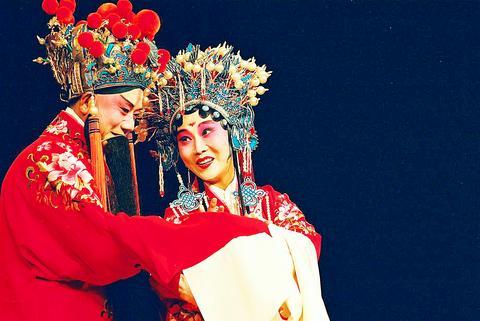
PHOTO COURTESY OF CHIEN HUEI CULTURAL AND EDUCATIONAL FOUNDATION
Most importantly for Kunju fans, director Gu Du-huang (顧篤璜) has selected 28 of the play's 55 episodes, to be performed on three consecutive evenings. As most troupes these days perform only five episodes, the new show is much more comprehensive. Roughly half of the 28 episodes have not been performed in the last 100 years.
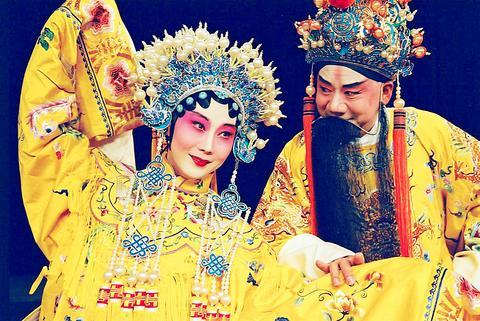
PHOTO COURTESY OF CHIEN HUEI CULTURAL AND EDUCATIONAL FOUNDATION
The Palace is a love tragedy about Tang emperor Li Long-ji and his mistress Yang Yu-huan. Yang is one of the most sublime beauties from Chinese history. When the emperor first sees her she is his daughter-in-law, but he wrests her from his son. The emperor grows so obsessed with her that he ignores all affairs of state. Seeing the state sliding into mayhem, rebels launch a subversion, driving the emperor and his retinue into escape. During the escape, all palace officials blame Yang for the decline of the empire. Due to their pressure, the emperor reluctantly agrees that Yang should commit suicide.
Ching dynasty Hong Sheng's (洪昇) dramatization of the history dwells on the devastating effects of their romance on the Tang dynasty. Hong ended the play with the emperor, tortured since Yang's death by the thought of her beauty, finally joining her in heaven. It is revealed that the emperor and his concubine were two gods banished from heaven to meet again as mortals.
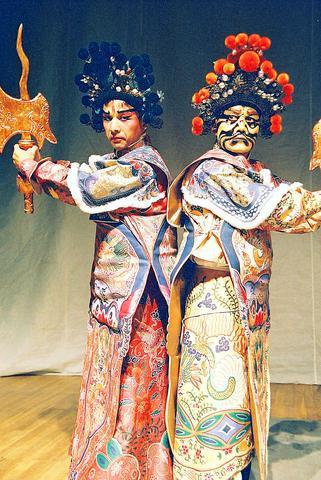
PHOTO COURTESY OF CHIEN HUEI CULTURAL AND EDUCATIONAL FOUNDATION
The best-known Kunju scholar in Kunju's hometown of Suzhou, 77-year-old Gu has devoted his life to research and perform Kunju for over 50 years. The Cultural Revolution of the 1960s and funding shortages in the 1980s has only fueled his passion for Kunju. Although he was not able to come to Taipei for the premiere, due to heart problems, Gu sounded excited about the performance in a telephone interview.
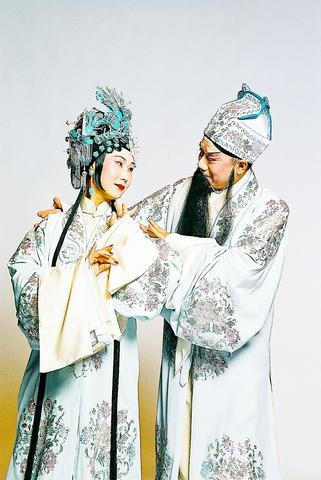
PHOTO COURTESY OF CHIEN HUEI CULTURAL AND EDUCATIONAL FOUNDATION
The charm of The Palace, Gu said, comes from its palatial period setting. "The play tells a familiar story. Its music is beautiful and its verses are of significant literary value. Most importantly, audiences past and present are both drawn to its stage setting and to all the magnificence of the Tang palace."
Gu is one of the few in China who have consistently tried to preserve Kunju traditions and resisted the prevalent trend toard innovated Kunju, which emphasizes stage effects and incorporates foreign elements.
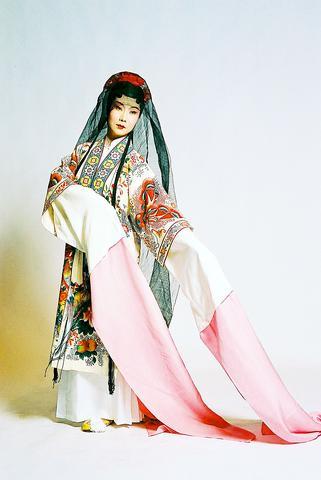
PHOTO COURTESY OF CHIEN HUEI CULTURAL AND EDUCATIONAL FOUNDATION
"There have been too many productions of innovated Kunju operas, which target younger audiences. The result is often that older audiences are unhappy with the changes and the young audiences are not really thrilled. The tradition-minded are now winning the day. The younger audiences are becoming more curious about Kunju traditions and the elders have come back into the theater."
Despite Gu's attention to tradition, directing the episodes that have not been performed over 100 years proved a difficult job. "Many episodes have not been performed continually. It's hard to ascertain how actors in ancient times sang the scores. I could only try to guess how they would have interpreted them."
Gu's insistence on an unadulterated traditional interpretation is shared by Yip, the artistic director of the show. "Our collaboration was a very happy one. Our ideas on the play were the same from the very beginning. Yeh wanted the production to be `more traditional than traditional.' That was exactly what I wanted.
"I told Yeh that all the human characters have to stick to tradition and he can do whatever he wants with the gods and supernatural characters. His designs for the stage settings also comply with tradition."
The 140 costumes are based on illustrations and portraits from Ming dynasty documents. Some 60 seasoned Suzhou tailors worked for over one year to produce the delicate patterns on the magnificent dresses of the palace characters.
A nostalgia for old-time Kunju and a concern for the preservation of the opera set the tone of Gu's discussion of the show. "Zhao Cheng-li (趙承林) and Wang Fang (王芳) [lead actor and actress] are among the best Suzhou Kunju opera performers. Zhao has an excellent singing voice and Wang is riveting as an actress. They both have decades of experience in Kunju. But I must say they cannot match the level of older generations of singers."
In Gu's hometown, there are only two such artists still alive. They are both in their 90s and still teach Kunju. Gu's deepest concern is whether their artistic achievements can be repeated by younger generations. "In the Ching dynasty, Palace was performed in its unabridged form of 55 episodes. The episodes have to be performed for young people to learn from the performers and for the traditions to survive." This is the driving force behind Gu's efforts to stage a record-setting 28 episodes.
"Kunju is the highest achievement of Chinese opera. If we are to preserve the art form in the best way, we have to preserve its completeness," Gu said.
Asked why he has supported the classic art form over 50 years, Gu said, "Kunju Opera is a trap. Once you get caught, you fall deeper and deeper in love with it."

This year will go down in the history books. Taiwan faces enormous turmoil and uncertainty in the coming months. Which political parties are in a good position to handle big changes? All of the main parties are beset with challenges. Taking stock, this column examined the Taiwan People’s Party (TPP) (“Huang Kuo-chang’s choking the life out of the TPP,” May 28, page 12), the Democratic Progressive Party (DPP) (“Challenges amid choppy waters for the DPP,” June 14, page 12) and the Chinese Nationalist Party (KMT) (“KMT struggles to seize opportunities as ‘interesting times’ loom,” June 20, page 11). Times like these can

June 23 to June 29 After capturing the walled city of Hsinchu on June 22, 1895, the Japanese hoped to quickly push south and seize control of Taiwan’s entire west coast — but their advance was stalled for more than a month. Not only did local Hakka fighters continue to cause them headaches, resistance forces even attempted to retake the city three times. “We had planned to occupy Anping (Tainan) and Takao (Kaohsiung) as soon as possible, but ever since we took Hsinchu, nearby bandits proclaiming to be ‘righteous people’ (義民) have been destroying train tracks and electrical cables, and gathering in villages

Dr. Y. Tony Yang, Associate Dean of Health Policy and Population Science at George Washington University, argued last week in a piece for the Taipei Times about former president Ma Ying-jeou (馬英九) leading a student delegation to the People’s Republic of China (PRC) that, “The real question is not whether Ma’s visit helps or hurts Taiwan — it is why Taiwan lacks a sophisticated, multi-track approach to one of the most complex geopolitical relationships in the world” (“Ma’s Visit, DPP’s Blind Spot,” June 18, page 8). Yang contends that the Democratic Progressive Party (DPP) has a blind spot: “By treating any

One of the biggest sore spots in Taiwan’s historical friendship with the US came in 1979 when US president Jimmy Carter broke off formal diplomatic relations with Taiwan’s Republic of China (ROC) government so that the US could establish relations with the People’s Republic of China (PRC). Taiwan’s derecognition came purely at China’s insistence, and the US took the deal. Retired American diplomat John Tkacik, who for almost decade surrounding that schism, from 1974 to 1982, worked in embassies in Taipei and Beijing and at the Taiwan Desk in Washington DC, recently argued in the Taipei Times that “President Carter’s derecognition